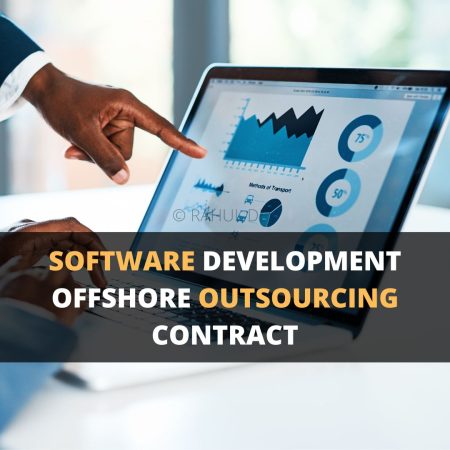Defining the scope of work, including services and expected end products, sets the foundation for successful outsourcing contracts. A clear “statement of work” (SoW) should be established, detailing the project’s requirements, timeline, deliverables, and payment schedules. Provisions for changes in service and “work made for hire” acknowledgements are also essential, ensuring that both parties understand their roles and obligations.
Payment/Compensation: Timely and Fair
Payment terms should be mutually agreed upon to guarantee developers receive compensation according to the contract’s terms. Common structures include fixed-price, time and material, or milestone-based arrangements. Choosing the most suitable payment structure is vital for fostering trust and maintaining a strong working relationship between parties.
Intellectual Property (IP): Ownership and Protection
Intellectual property rights play a critical role in offshore software development contracts. Work-for-hire contracts typically grant IP ownership to the employer or company. To avoid conflicts over IP rights, clear definitions of trade secrets, proprietary rights, authorship, and due diligence on existing intellectual propertymust be provided. Ensuring proper protection of your IP assets is key to long-term success and safeguarding your company’s innovations.
Confidentiality: Safeguarding Sensitive Information
Confidentiality is a paramount concern when disclosing sensitive information to offshore IT providers. Non-Disclosure Agreements (NDAs) should be signed, outlining the confidentiality of disclosed information, consequences for breaches, and exceptions to confidentiality. Provisions should extend beyond the contract’s duration, guaranteeing that your company’s information remains protected even after the collaboration ends.
Termination: Clear Grounds and Implications
Termination clauses should be included in the contract, specifying notice periods, conditions, and financial risks associated with premature termination. Whether it is project completion, a major breach, or a decision by either party, having clear termination provisions helps mitigate potential disputes and protects both parties’ interests.
Dispute Resolution: Efficient and Cost-effective
Arbitration or mediation is generally preferred for dispute resolution in software development contracts. Cross-border agreements can complicate jurisdiction and applicable law, making it crucial to designate these details in advance. Choosing an efficient and cost-effective dispute resolution method can save time and resources for both parties involved.
Legal Considerations: Compliance and Employee Classification
Offshore software development contracts must comply with foreign laws and consider whether developers are employees or independent contractors. Different legal requirements and tax implications apply to each classification, so understanding labor legislation in both the developer’s and company’s countries is essential. Ensuring compliance and proper classification helps avoid potential legal issues down the line.
Acme Corp: A Success Story in Offshore Software Development Outsourcing
Background
Acme Corp, a US-based technology company, recognized the need for a cutting-edge software application to maintain a competitive edge in the market. However, they lacked the in-house expertise and resources to develop the application themselves. To access top talent at a lower cost without compromising quality, Acme Corp decided to hire an offshore development team in India.
Navigating the Challenges
Acme Corp faced potential pitfalls, such as unclear rights, payment terms, confidentiality, and legal issues. To overcome these challenges, they meticulously crafted an offshore software development outsourcing contract addressing crucial aspects, including:
Scope: Acme Corp created a detailed SoW, specifying the services, expected end product, timeline, milestones, and payment schedules. They included provisions for changes and “work made for hire” acknowledgements.
Payment: Acme Corp opted for a milestone-based payment structure, ensuring timely payments to the developers upon completion of each project stage.
Intellectual Property: The contract specified that Acme Corp would retain ownership of all IP created during the project. They conducted due diligence on their existing IP and provided clear definitions of trade secrets, proprietary rights, and authorship.
Confidentiality: Acme Corp signed NDAs with the offshore developers, outlining the confidentiality of disclosed information and consequences for breaches. Confidentiality provisions extended beyond the contract’s duration.
Termination: The contract included termination clauses, specifying notice periods, conditions, and financial risks associated with premature termination.
Dispute Resolution: Acme Corp chose arbitration as the preferred method, designating the governing law and jurisdiction for any disputes that might arise.
Legal Considerations: Acme Corp ensured compliance with Indian labor laws and regulations, treating the developers as independent contractors to avoid complications with employee classification.
The Outcome
By carefully addressing critical contract aspects, Acme Corp successfully collaborated with the offshore development team in India. Throughout the project, they maintained open communication channels and fostered a culture of trust and mutual respect. The software application was completed on time and within budget, exceeding Acme Corp’s expectations.
The project’s success not only granted Acme Corp a competitive edge in the market but also demonstrated the potential benefits of offshore software development outsourcing. As a result, Acme Corp has continued to expand its offshore partnerships, leading to further innovation and growth.
Key Takeaways
Acme Corp’s success story serves as an excellent example of the importance of well-crafted offshore software development outsourcing contracts. By carefully considering scope, payment terms, IP, confidentiality, termination, dispute resolution, and legal requirements, companies can mitigate risks and achieve project success. The Acme Corp experience shows that with the right approach, offshore software development outsourcing can lead to significant benefits, including cost savings, access to top talent, and accelerated innovation.



